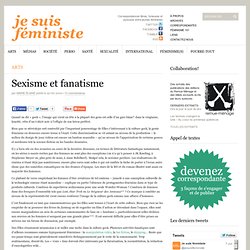

Sexisme et fanatisme. Quand on dit « geek », l’image qui vient en tête à la plupart des gens est celle d’un gars blanc* dans la vingtaine, lunetté, vêtu d’un t-shirt noir à l’effigie de son héros préféré.

Bien que ce stéréotype soit contredit par l’important pourcentage de filles s’intéressant à la culture geek, la gente féminine en demeure encore tenue à l’écart. Cette discrimination se vit autant au niveau de la production – le milieu du design de jeux vidéos est encore un bastion masculin – qu’au niveau de l’appréciation de certains genres et médiums tels la science-fiction ou les bandes dessinées. The (Fake) Geek Girl Project / 4: Why this debate, and why now? This is the second to last installment of this series.

You may read the foreword to this series, As Always, it Started With Star Trek: A Study On Geek Girls, as well as parts 1, 2 and 3. Why did the Fake Geek Girl debate reach such intensity in 2012? Regardless of their opinions, the authors o the interventions I analyzed, rants and responses alike, formulate two main theories to answer this question. The first theory is that the passage of geek culture from the margins to the mainstream of popular culture is causing important changes which can in turn lead to tensions and infighting. According to this theory: I had originally intended to further explore this theory and draw comparisons between geek culture and other cultures which emerged in the margins, such as Hip-Hop or Punk culture, as they have also undergone the process of mainstreamisation.
Many of the women who took part in the debate state that they have been geeks for years, even decades. References Potter, J. Geek Anthropologist Marie-Pierre Renaud on the "Fake Geek Girl" Debate. By Jarrah Hodge A longer version of this article was originally posted at Trekkie Feminist For anyone not familiar with the “fake geek girl” issue, it flared up online in 2012 after two articles were published.

The first was by Tara Tiger Brown at Forbes telling supposedly attention-seeking “fake geek girls” to “please go away”. A couple months later. Joe Peacock wrote an article for CNN called “Booth babes need not apply”, in which he took issue with: “pretty girls pretending to be geeks for attention.” The debate spiralled out from there, leading to a couple of different memes including the “Idiot Geek Girl” meme. So I was excited to see an article about a study on the “fake geek girl” debate by Marie-Pierre Renaud. In the intro to her research, Renaud says she was surprised that she kept encountering an assumption that women were historically rare in geek culture. She said overall there isn’t really research or hard data to support that argument. Jarrah Hodge. The (Fake) Geek Girl Project / 3: Who Cares? You may read the foreword to this series, As Always, it Started With Star Trek: A Study On Geek Girls, as well as parts 1 and 2.

For a little over two years now, geek culture has been tormented with a raging debate, that of the “fake” geek girl. This debate has divided geeks between those who reinforce the notion that some women pretend to be geeks in order to attract the attention of men, and those who contest it. Since late 2012, I have been analyzing this debate and following the changes it brought forth in geek culture. This week I am providing a summarized analysis of the ideas expressed in the responses I consulted while analyzing the Fake Geek Girl Debate*. These are much more diverse that those expressed in the rants I described in part 2 of this series: authors of responses produced denser contents, and used a wider variety of formats to express themselves. The (Fake) Geek Girl Project / 2: Fight the Attention Seekers!
You may read the foreword to this series, As Always, it Started With Star Trek: A Study On Geek Girls and the first part which offers an overview of this series and of the methodology used in this project.

In my quest to better understand the fake geek girl debate, I analysed 6 rants and over 40 responses*. The first of the six rants, the Idiot Nerd Girl meme, was created in 2010. Originally used to mock girls self-identifying as nerds but considered as ignorant and idiotic, it exists in hundreds of variations, which generally draw a comparison between a girl’s claim to be a geek or nerd and her alleged lack of knowledge on a specific topic, her lack of involvement in geek spaces and activities, or her physical appearance. The meme was reverse engineered to contest the original intent behind its creation. In 2012 Rachel Edidin, a Dark Horse Comics editor, created a tumblr page listing thousands of new variations of this meme with the help of friends and Twitter followers. 1. 2. 3.
That Pesky Subi - sourcedumal: bettersupes: "Little Girls Are... La nouvelle Miss Marvel est une adolescente musulmane. Kamala Khan est l'une des premières d'une série de personnages à la fois féminins et musulmans qui sera mise de l'avant par Marvel Entertainment, pour refléter la diversité culturelle grandissante de ses lecteurs, tout en conservant la pertinence contemporaine qui l'anime depuis la création de Spider-Man et X-Men, au début des années 1960.

L'auteur G. Willow Wilson et l'artiste Adrian Alphona, de concert avec l'éditrice Sana Amanat, affirment que la série reflète le monde vibrant et kinétique de Kamala Khan, qui apprend à concilier ses superpouvoirs, les attentes de sa famille et l'adolescence. Pour Mme Amanat, la série reflète un «désir d'explorer la diaspora musulmane-américaine d'un point de vue authentique» et ce que signifie d'être jeune et perdu au milieu des attentes des autres, tout en racontant l'histoire d'une adolescente aux prises avec des superpouvoirs. Wrapped: New York Comic Con May Need To Move Out.